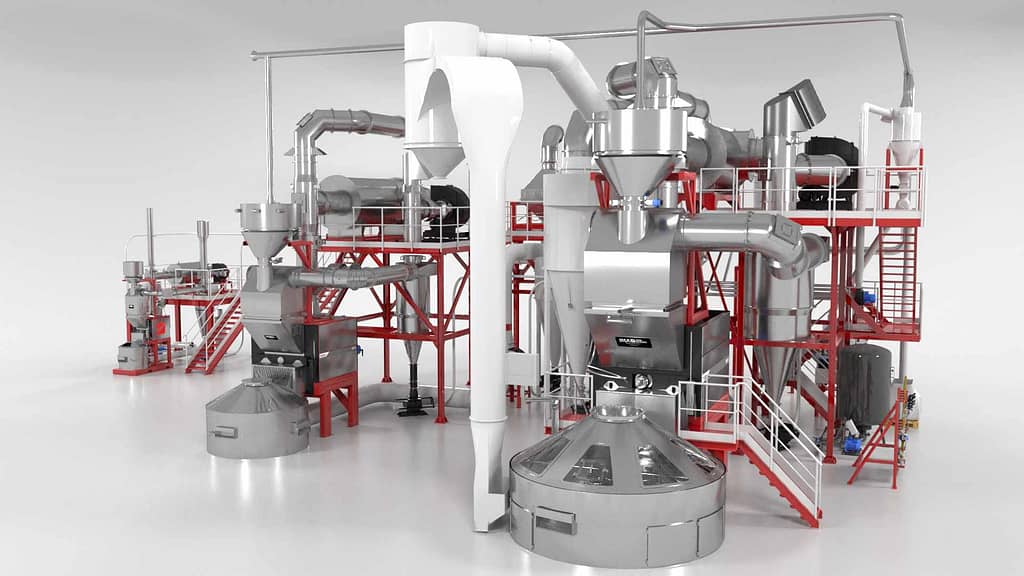IMA Petroncini describes how it continues to innovate in the coffee field and develops roaster engineering to reach the highest level of production efficiency.
With more than 100 years of experience in the market, IMA Petroncini is not new to coffee processing. Its expertise and solid company know-how is based on the installation of over 4700 roasting plants throughout the world.
“This has led IMA Petroncini to be recognised as a leading supplier in the coffee processing industry, providing tailored engineered plants for coffee processing, from green coffee receiving up to the roasters; from the grinders up to the most advanced degassing systems,” says IMA Petroncini Head of Research and Development Maurizio Mazzoni.
As IMA Petroncini has grown and evolved over the years, so too has the batch volume of Petroncini roasters, starting with its one-kilogram specialty shop roaster, TT Traditional range for small- to- medium- sized production, and its best-selling TMR models for industrial-scale needs. The largest in the range is the 720-kilogram drum roaster.
“We continue to innovate in our field and are always developing our roasters. The biggest difference from the past to now, is our roasting control system, which is able to guarantee reliability, consistency, and repeatability of the end product,” says Maurizio.
“Thanks to heat control, roasting air volume and the drum rotation speed, the Petroncini TT Roaster allows the operator to vary their method of transferring heat to the bean, achieving a perfect balance between convection and conduction. Creativity in personalising the product is in the hands of the roaster and IMA Petroncini works to provide all the tools capable of turning that creativity into reality.”
Ranging from capacities of 240-kilograms up to 1600-kilograms per hour, TT Roasters are suitable for medium-sized businesses, allowing the roaster to meet a wide range of customer requirements.
“The air convection technology allows perfect coffee roasting control, optimising the thermal efficiency and the flavour development,” says Maurizio.
He says the TMR model roaster is one of Petroncini’s greatest technical innovations thanks to its Air Recirculation and Heat Recovery System. The first unit was installed in Chile in 1995, and ever since, Petroncini has been committed to updating and upgrading the system to better maintain consistency.
“TMR models are modular drum roasters with a 90 per cent convection to 10 per cent conduction ratio, suitable for a wide range of coffee roasting profiles, and with a capacity to roast from 1000 to 3600 kilograms per hour,” he says.
“The technology is now so efficient it allows us to have no more than one second ending time difference between one batch and the next, so consistency is extremely high.
“The TMR uses just one burner as a heat generator and after burner to reduce carbon dioxide, nitrogen oxides, and volatile organic compounds emissions due to the roasting plants. The heat recirculation allows, on average, 30 to 35 per cent energy saving, compared to traditional roasters, and this focus on sustainability is now more important than ever.”
Maurizio says IMA Petroncini has also introduced a different, but just as impressive, new control software to its flagship TMR series called Orchestra.
“With Orchestra, the roaster can set up to 30 roasting set-points, including the temperature to reach each set point, and the time interval in which to reach it, as well as drum rotation speed and the flow rate of the heating fluid. During the setting of the various setpoints, Orchestra shows a simulation of the roasting profile and the ending time estimated, allowing the operator to preview the final result,” he says.
“During roasting, Orchestra allows you to view the curve in progress alongside the pre-set profile. These two profiles will overlap in the visualisation of the roasting trend, thanks to the precise self-tuning of the machine valves, burner, and aspiration system power.
Orchestra can obtain constant roasting results over time, especially for products such as pods and capsules, which self-tunes the machine parameters on the basis of the humidity of green coffee, the quantity of the batch entering the roaster, and environmental variables.
“I always tell customers that repeatability is not only about the quality of the coffee. It’s about achieving the same taste in the cup customers expect time and time again,” Maurizio says.
He adds that IMA Group’s acquisition of Petroncini in 2018 was needed to take the company to the next level. Most important to the manufacturer’s growth, Maurizio says, is its consistency.
“IMA Petroncini is developing very ambitious projects on roasting technology to minimise the environmental impact and guarantee a future-proof automation for coffee factories as well,” he says.
For more information, visit www.petroncini.com or www.ima.it/coffee
This article appears in the October 2023 edition of BeanScene. Subscribe HERE.


